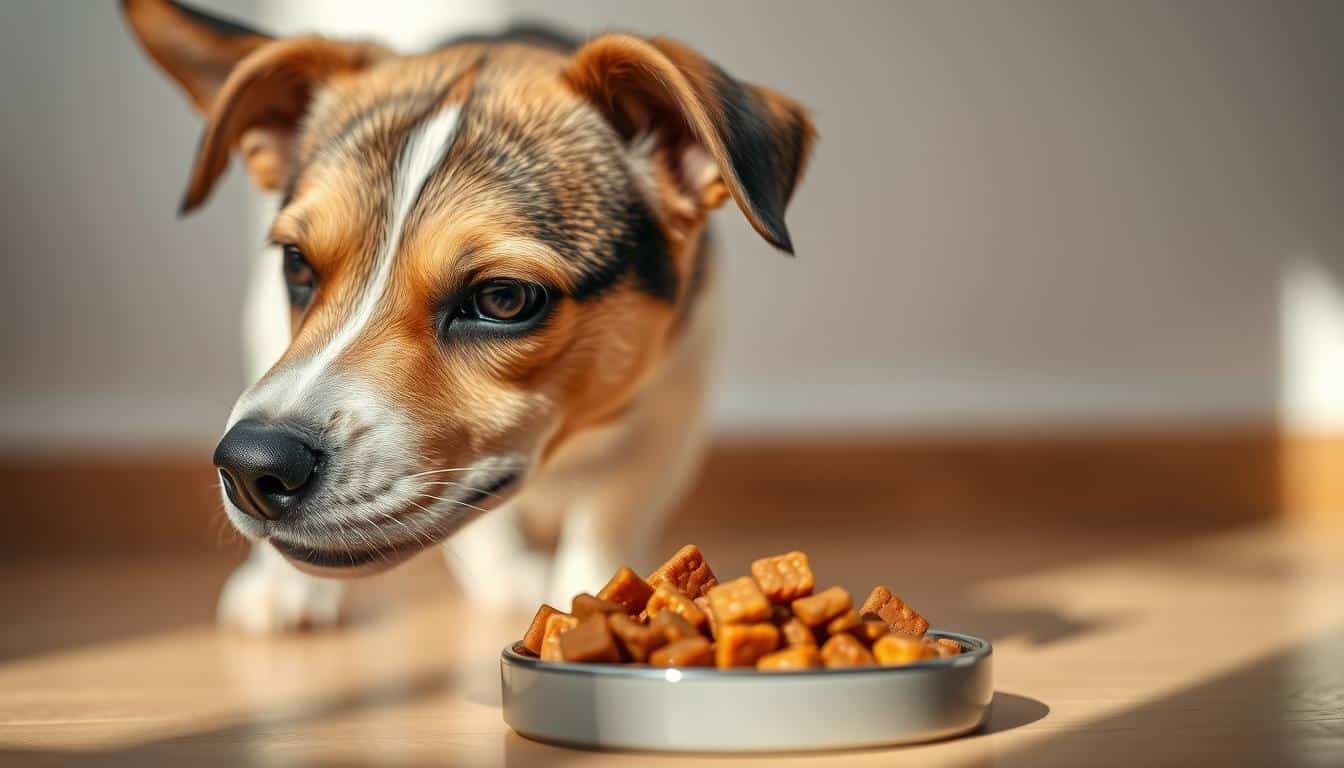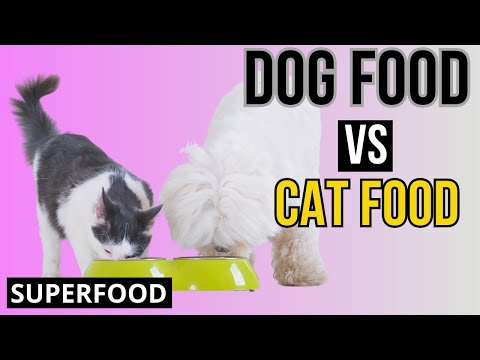Many pet owners face the dilemma of their furry companions sneaking bites of the wrong food. While a dog eats cat food occasionally, it’s essential to understand the implications. This article explores the differences between dog food and cat food, the potential risks, and expert advice to ensure your pet’s health.
Cat food is formulated specifically for feline dietary requirements, which differ significantly from those of dogs. Regular consumption can lead to nutritional imbalances, affecting the animal’s overall well-being. Veterinarians emphasize the importance of species-specific diets to meet each pet’s unique needs.
This guide will highlight the nutritional profiles of both types of food, discuss the health risks of improper feeding, and provide strategies to prevent accidental access. By the end, readers will have the knowledge to make informed decisions about their pet’s diet.
Key Takeaways
- Cat food is not suitable for dogs due to differing nutritional requirements.
- Occasional ingestion is usually harmless, but regular feeding can cause health issues.
- Dog food and cat food have distinct nutrient profiles tailored to each species.
- Veterinarians recommend sticking to species-specific diets for optimal health.
- Preventing accidental access to cat food is crucial for maintaining a balanced diet.
Understanding the Nutritional Differences between Dogs and Cats
Nutritional requirements vary significantly between dogs and cats. While both are beloved pets, their biological needs dictate distinct dietary profiles. Understanding these differences helps ensure optimal health and prevents potential complications.
Cat vs. Dog Nutritional Profiles
Cats are obligate carnivores, meaning they require a diet rich in animal protein and fat. Their bodies cannot synthesize certain nutrients, like taurine, which must be obtained from their diet. Cat food is formulated with higher protein and fat levels to meet these needs.
Dogs, on the other hand, are omnivores. They can process a more varied diet, including both plant and animal sources. Their nutritional profiles include balanced levels of protein, carbohydrates, and fats, tailored to their active lifestyles.
Specific Nutritional Requirements for Each Pet
According to AAFCO standards, adult cats require a minimum of 26% protein and 9% fat in their diet. Dogs, however, need only 18% protein and 5.5% fat. These differences reflect their unique biological requirements.
Reputable brands like Royal Canin, Hill’s, and Purina Pro Plan offer species-specific diets designed to meet these standards. Balanced nutrition is critical to avoid deficiencies and ensure long-term health.
“Feeding one species’ food to another can lead to imbalances and health issues,” says a veterinary nutrition expert.
Understanding these distinctions helps pet owners make informed decisions about their animal’s diet. By prioritizing species-specific nutrition, they can support their pet’s overall well-being.
Can I Feed My Dog Cat Food: Risks and Benefits
While dogs may enjoy the taste of cat food, it’s not designed for their nutritional needs. Occasional ingestion might seem harmless, but it can lead to both short-term and long-term health issues. Understanding these effects helps pet owners make informed decisions.
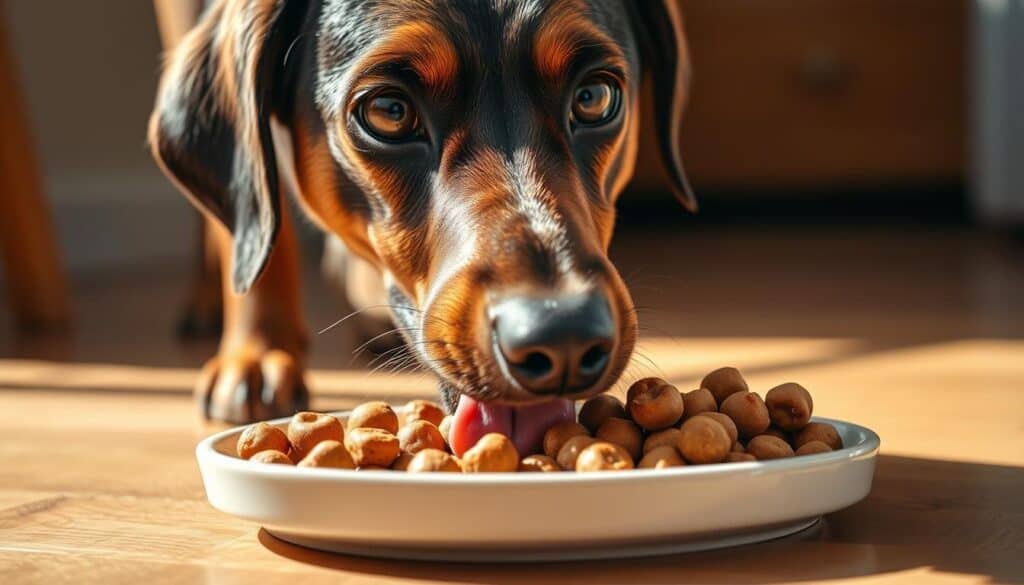
Short-Term Effects on Health
Eating cat food can cause mild stomach upset in dogs. Symptoms like vomiting or diarrhea are common after consumption. These issues arise because the high protein and fat content in cat food is harder for dogs to digest.
While a single incident rarely causes severe problems, repeated exposure can exacerbate these symptoms. Monitoring the animal’s behavior after accidental ingestion is essential to ensure no lasting effects.
Long-Term Health Concerns
Regular consumption of cat food can lead to serious health complications. Obesity is a common issue due to the higher calorie content. Pancreatitis, a painful inflammation of the pancreas, is another risk linked to excessive fat intake.
Dogs have different nutritional requirements than cats. Over time, the imbalance in nutrients can disrupt their system. Veterinarians emphasize the importance of a species-specific diet to avoid these problems.
“Feeding cat food to dogs regularly can lead to nutritional deficiencies and chronic health issues,” says a veterinary nutrition expert.
While the benefits of cat food for dogs are minimal, the risks outweigh them. Pet owners should prioritize their animal’s long-term health by sticking to appropriate diets. Consulting a veterinarian for guidance is always recommended.
Potential Health Risks of Dogs Eating Cat Food
Health complications arise when pets consume food not designed for their species. While occasional ingestion may seem harmless, regular consumption of cat food can lead to significant health issues for dogs. Understanding these risks helps pet owners prioritize their animal’s well-being.
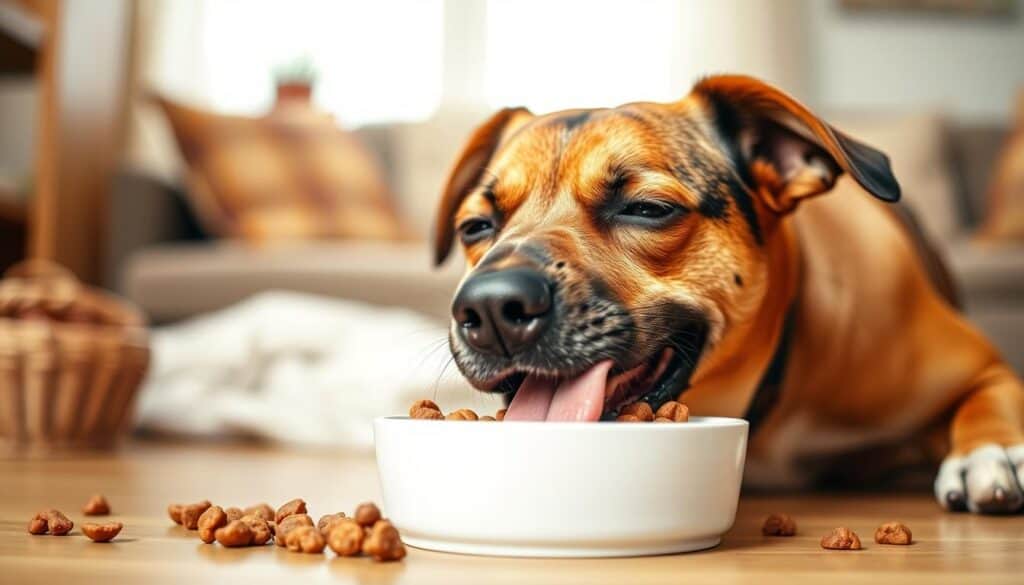
Gastrointestinal Upset and Pancreatitis
The high protein and fat content in cat food can unsettle a dog’s digestive system. Symptoms like vomiting, diarrhea, and abdominal pain are common after ingestion. These issues occur because dogs are not adapted to process such concentrated nutrients.
Repeated exposure increases the risk of pancreatitis, a painful inflammation of the pancreas. This condition can lead to lethargy, loss of appetite, and severe discomfort. Immediate veterinary care is crucial if these symptoms appear.
Other Possible Health Complications
Long-term consumption of cat food can cause weight gain and obesity due to its higher calorie content. Dogs with specific dietary needs, such as those requiring low-fat or moderate-protein diets, are particularly vulnerable.
Nutrient imbalances are another concern. Dogs require a balanced intake of vitamins and minerals, which cat food does not provide. Over time, deficiencies can lead to chronic health problems.
“Feeding the wrong diet can disrupt a pet’s nutritional balance and lead to serious complications,” says a veterinary expert.
Pet owners should monitor their animals for signs of distress, such as lethargy or vomiting. Consulting a veterinarian for dietary guidance ensures the animal’s long-term health and well-being.
Strategies to Prevent Your Dog from Eating Cat Food
Preventing a dog from eating cat food requires strategic planning and practical solutions. By implementing effective techniques, pet owners can ensure both animals receive the right diet without compromising their health.
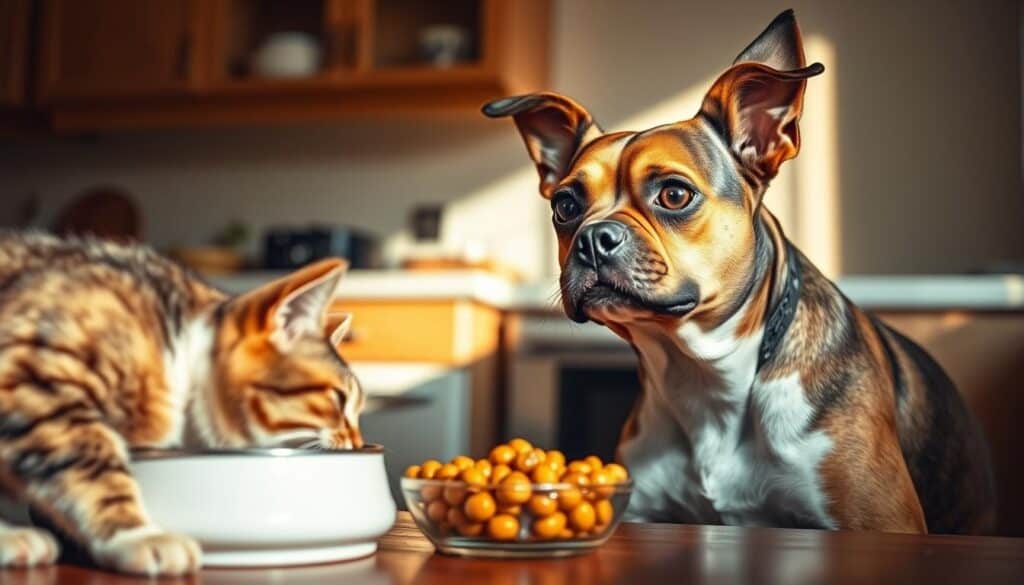
Feeding Techniques for Multi-Pet Households
In households with multiple pets, managing feeding times and locations is crucial. Feeding cats in elevated areas, such as countertops or shelves, can minimize temptations for dogs. This approach ensures cats can eat undisturbed while keeping their food out of reach.
Using microchip-activated feeders is another effective strategy. These devices allow only the designated pet to access the bowl, preventing accidental consumption. Scheduled feeding times, rather than leaving food out, also help regulate intake and reduce the risk of overeating.
Safe Feeding Zones and Access Control
Creating separate feeding zones is essential for maintaining dietary boundaries. Baby gates or pet playpens can be used to restrict access to specific areas. This ensures each animal has its own space to eat without interference.
Cat doors with RFID technology are another innovative solution. These doors allow only cats to enter designated feeding areas, keeping dogs out. Regularly observing pet behavior and adjusting strategies as needed ensures long-term success in preventing dog eat cat scenarios.
“Establishing clear boundaries and using specialized feeding devices can significantly reduce the risk of dietary issues,” says a pet care expert.
By prioritizing these methods, pet owners can protect their dogs from potential nutrient imbalances and health complications like obesity. A well-planned approach ensures both pets thrive on their species-specific diets.
Conclusion
Ensuring pets receive the right diet is essential for their long-term health. Cat food and dog food are formulated differently to meet the unique needs of each species. While occasional ingestion may not cause immediate harm, regular consumption can lead to serious health issues like gastrointestinal upset, pancreatitis, and obesity.
In multi-pet households, adopting proper feeding strategies is crucial. Separating feeding areas and using specialized devices can prevent accidental access. If any concerning signs appear, consulting a veterinarian is highly recommended.
This article emphasizes the importance of species-specific diets for optimal well-being. By following expert-backed recommendations, pet owners can ensure their furry companions thrive on balanced nutrition tailored to their biological needs.

